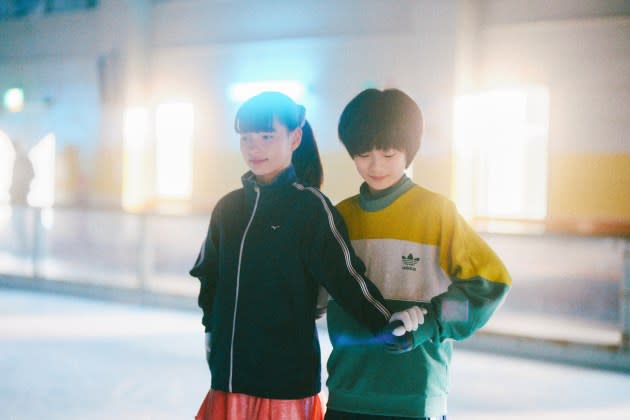‘My Sunshine’ Review: Hiroshi Okuyama’s Second Feature Traces a Gentle Trajectory Through Changing Seasons

Some films prioritize a strident political cause, others set out to terrify or thrill. This touching and simple story from Japanese filmmaker Hiroshi Okuyama, premiering in Un Certain Regard at Cannes, is a gentler affair, with modest ambitions that it realizes effectively. Set on a small Japanese island, the film’s slight but sweet narrative follows a quartet of characters — young hockey player Takuya (Keitatsu Koshiyama), proficient skater Sakura (Kiara Nakanishi), figure-skating tutor Arakawa (Sōsuke Ikematsu) and his boyfriend (Ryûya Wakaba) — as they navigate subtly shifting interpersonal dynamics while a cold but beautiful winter waxes and wanes around them.
Every scene is set up with a very deliberate aesthetic sense. A snowy icing-sugar landscape, a baseball field tinged with pale turquoise light, an indoor ice-rink shimmering in a golden haze: Nothing feels haphazard or anything less than picture-perfect. This is the result of a fruitful collaboration between director and DP, made simpler by the fact that they’re the same person. Okuyama not only writes and directs, but takes lensing and editing credits too.
More from Variety
He introduces his characters with the same exacting sense of portraiture that he brings to his landscapes. We meet Takuya as a shy boy with a stutter who seems ill-suited to activities like ice hockey. Smacked in the chest by a hockey puck, he’s swiftly ushered out of the rink, and seems essentially relieved not to be there anymore. His attention is captured by a figure skater, a girl about his own age, whose use of the rink, in contrast to the hockey players, is unbelievably graceful — twirling and gliding and spinning, she carves elegant curves into the ice. This is Sakura, training with her coach Arakawa, who quickly notices how dumbstruck the young boy is.
One of the film’s many finely wrought ambiguities is around the extent to which Takuya’s attention is first captured by the girl or by the skating — or whether it is, in fact, the magical dovetailing of the two that so enchants him. Whatever the case, a spell has been cast. Coach Arakawa spots an opportunity for collaboration, which leads ultimately to the trio training for a figure-skating competition.
As you might guess, this delicate dynamic isn’t suddenly going to turn into a “Rocky”-style sports movie with fist-pumping montages and a do-or-die, against-the-odds climax. Whether Takuya and Sakura will do well in the competition is a bit of an afterthought compared to the gradual tracing of the companionable bond that forms between them, or observing the mellowing climate as the island slowly emerges from winter into spring.
A complementary strand is anchored by Arakawa, a neat little role for Ikematsu, who first tasted international recognition as the young nephew in the 2003 Tom Cruise vehicle “The Last Samurai” — giving him, one assumes, some personal experience to draw on as a character hoping to help young people perform under a spotlight. Coaches in movies are often hard-bitten sorts seeking vicarious success that has always eluded them, or that they have tasted once and can’t quite let go. Arakawa is a more peaceful sort. He seems largely at ease with his own past success as a figure skater and his present low-key existence, though at least one character questions why he is so keen to succeed with the newly formed duo rather than be content with his existing (and excellent) student.
The film’s look keeps it engaging. There’s a persistent cultural myth that some Inuit languages have a dozen, or fifty, or a hundred words for different kinds of snow. That’s not true, but Okuyama seems to have discovered something of that order of pretty, pale, ever-shifting pastel colours for his compositions of snow and ice, shimmering subtly with faint blushing pinks, delicate mauves and barely-there frosted sky blues. All are destined to give way to a lusher but still impeccably tasteful arrangement of hues come spring.
One choice that’s a little less of a piece with the film’s subtlety is the repeated use of the celebrated Clair de Lune movement from Debussy‘s Suite Bergamasque to score several different sequences. The piece itself is as graceful and zephyr-like as anything else in “My Sunshine,” but it’s so famous that it registers almost as a zesty needle-drop of the Xavier Dolan school — purposely reappropriating classical pieces previously deemed to have passed into the realm of cliché.
Okuyama’s successful debut with the 2018’s “Jesus” — which won him, at the age of just 22, the New Directors’ prize at the San Sebastian Film Festival — saw him touted as the natural successor to names like Hirokazu Kore-eda. His champions may have hoped for more a more stridently auspicious follow-up than “My Sunshine,” which is gentle almost to a fault. But at just 28 (incidentally, the same age that Debussy began composing Clare de Lune), Okuyama has time on his side. He can afford to skate along for a little while, as he continues to explore and develop his artistic voice.
Best of Variety
Sign up for Variety’s Newsletter. For the latest news, follow us on Facebook, Twitter, and Instagram.

 Yahoo News
Yahoo News 